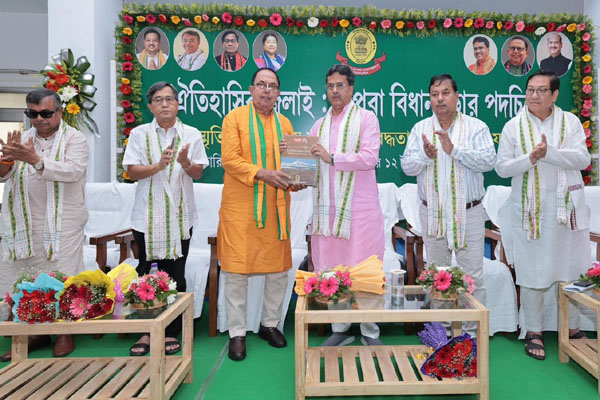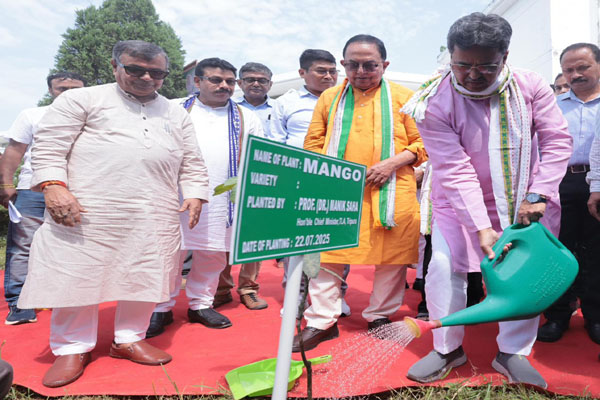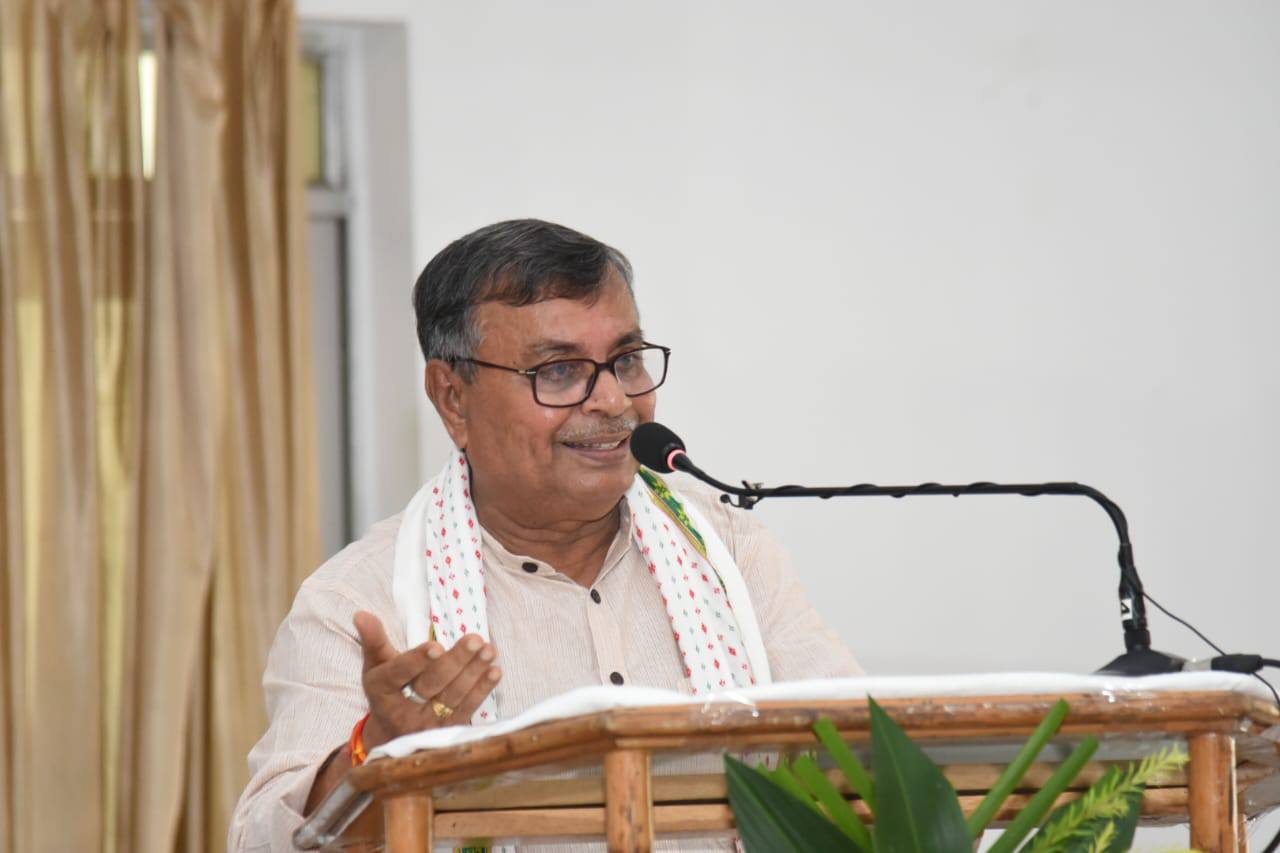 Assembly is the temple of democracy, Tripura Chief Minister Dr. Manik Saha said while highlighting the glorious history of the state’s assembly at an event on Tuesday.
Assembly is the temple of democracy, Tripura Chief Minister Dr. Manik Saha said while highlighting the glorious history of the state’s assembly at an event on Tuesday.
The ceremonial programme was organized at the assembly premises, marking the establishment of the Tripura Legislative Assembly and its relocation from the Ujjayanta Palace premises to the current location. According to Dr. Saha, this is the first time such an event has been organised in the state.
Dr. Saha said, just as humans and trees depend on each other, the opposition and the treasury bench in the Assembly also work in a symbiotic process for a healthy democratic ecosystem.
“On 1st July 1963, the Assembly was established. Today, 62 years have been completed. In the Assembly, so many things are raised for public welfare and for that, 60 MLAs are from 60 Assembly constituencies and the responsibility is very much. To protect democracy, the opposition says so many things and we also try to answer. We must maintain the decorum of the Assembly. Officials also play a key role. Assembly is like a temple. We must celebrate this day with due dignity,” he said.
Dr. Saha also suggested that from next year, the ex-Speakers who are still alive have to be invited along with the former Chief Ministers.
“Late Upendra Kumar Roy was the first Speaker of the Tripura Legislative Assembly from 1st July 1963 till 11th July 1967 during the then Chief Minister Sachindra Lal Singha. July 22, 2011, marked a historic milestone in the long journey of the Tripura Legislative Assembly, established in 1963. On this special day, the Assembly relocated from the Ujjayanta Palace premises to its current premises. On this sp ecial occasion, we recalled the glorious history of the Assembly and took part in a tree plantation drive within the Assembly premises,” said Dr. Saha.
ecial occasion, we recalled the glorious history of the Assembly and took part in a tree plantation drive within the Assembly premises,” said Dr. Saha.
On this occasion, Dr. Saha also planted a tree in the premises of the Assembly.
During the event, Speaker Biswabandhu Sen, Deputy Speaker Ram Prasad Paul, Chief Whip Kalyani Saha Roy, Parliamentary Affairs Minister Ratan Lal Nath, Leader of the Opposition Jitendra Chaudhury, Congress MLA Birajit Sinha, and several other members were present.
New Assembly building symbol people's aspirations, says Ratan Nath
Senior member of Tripura Legislative Assembly and minister Ratanlal Nath on Tuesday said the new assembly building is not just a structure; it's a symbol of democracy and the aspirations of the people.
Nath was recalling the history during the 'Historic July' event held at the assembly premises.
Nath paid tribute to the state’s rich democratic legacy and recounted lesser-known historical milestones that shaped Tripura's political journey.
 “This day is not just a date on the calendar, but a chapter of Tripura’s vibrant history,” he noted.
“This day is not just a date on the calendar, but a chapter of Tripura’s vibrant history,” he noted.
He reminded everyone that Tripura’s legislative journey officially began in 1963, but its roots trace back to the visionary leadership of Maharaja Bir Bikram Kishore Manikya Bahadur.
He said Maharaja Bir Bikram laid the foundation of modern Tripura, and contributed immensely in the development of infrastructure including roads, hospitals, schools, and even the airport.
“After his demise, Rajmata Kanchan Prabha Devi played a crucial role in integrating Tripura with India. On September 9, 1949, she signed the Instrument of Accession, and Tripura became a part of the Indian Union”, said the Minister.
Minister said that following its accession, Tripura was declared a Union Territory, and Ranjit Roy, ICS, was appointed as the first Chief Commissioner. The Territorial Council Act was enacted in May 1963 with the approval of the President of India. As per Article 239 of the Constitution, a representative administrator was appointed, and the Tripura Territorial Council was constituted with 30 elected and one nominated member.
He further informed that on this very day, Sachindra Lal Singha became the first Chief Minister of Tripura. This marked the beginning of democratic governance in the state. The Territorial Council was formally converted into the Tripura Legislative Assembly on July 1, 1963.
The minister highlighted that the first Assembly had 30 members, a system that continued till 1971. Tripura was later granted full statehood by an Act of Parliament in January 1972, providing the people of the state complete democratic rights.
Recollecting Tripura’s early political stalwarts, Minister shared that in 1963, prominent leaders who were elected as MLAs included Pramod Ranjan Das Gupta from Mohanpur, Sachindra Lal Singh from Agartala, Hemanta Deb from Old Agartala, Birchandra Debbarma from Takarjala, Umesh Lal Singh from Bishalgarh, Mansur Ali from Sonamura, Nripen Chakraborty from Khowai, Prafulla Kumar Das from Teliamura, Kalyan Nath Chowdhury from Dharmanagar.
He said that only five MLAs from the 1971 Assembly are alive today: Tapas Dey, Laxmi Nag, Ajay Biswas, Samir Ranjan Barman, and Sushil Chowdhury.
Reflecting on the evolution of the Assembly’s physical location, Nath shared that the first sessions were held in the old Secretariat Building in Agartala—where Birchandra State Library now stands. Later, the Assembly moved to the historic Ujjayanta Palace. In 2011, after 48 years, it was finally relocated to its current modern premises.